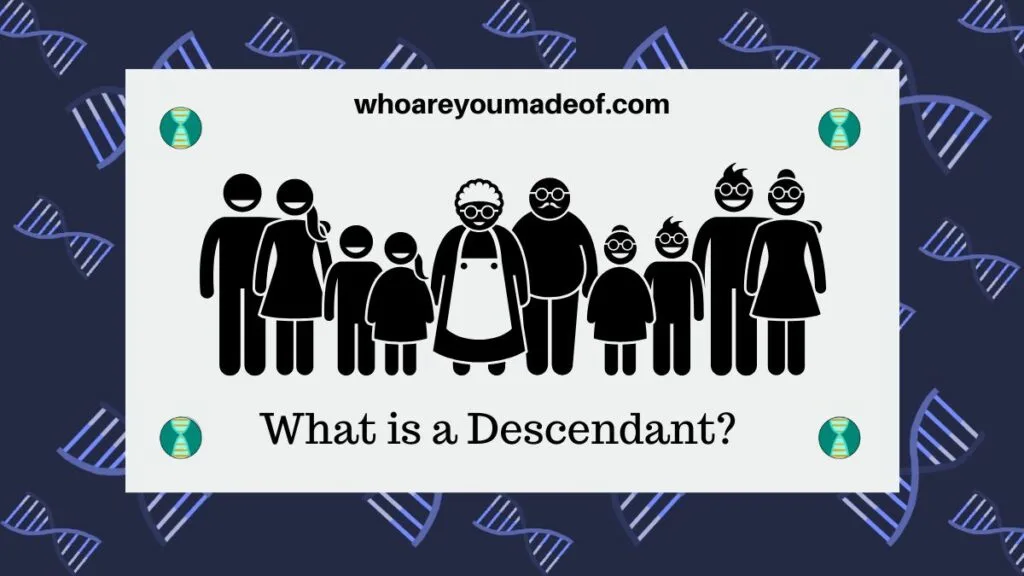Do you want to know what a descendant is, what it means to be a descendant, and how many descendants a person can have? In this post, learn the answers and more.

Ah, descendants, the opposite of an ancestor. For many people, descendants are a pretty important part of life.
What is a descendant of a person?
A descendant of a person is that individual's biological child or a child who they have adopted. In addition, any children, grandchildren, or great-grandchildren, adoptive or biological, of those children are also descendants of that individual.
Descendants go on for an unlimited number of generations, regardless of how many years are in a generation, which is why people who lived many hundreds or thousands of years ago have descendants alive today. In the same vein, many of us will have living descendants hundreds of years from now, even if we will not get to meet them.
People who are related by marriage, such as the spouse of a child or grandchild, are not typically viewed as descendants.
What is an example of a descendant?
Everyone alive is a descendant, which is neat because it is a way in which we all belong. We are descendants of all of our ancestors.
For example, you are a descendant of your parents, your grandparents, your great-grandparents, and your great-great grandparents. We could keep going forever, generation after generation, listing ancestors - all from whom you are descended.
The ancestors that I listed above might have descendants other than you, however. For example, you are descended from one child of your great-great grandparents, but they may have had other children who had descendants.
Are you a descendant of your parents?
You are a descendant of your parents, and your parents are your ancestors.
You, your children, your grandchildren and great-grandchildren (if you have them), are are descendants of your parents. Your parents may have other descendants, especially if you have other siblings, since your brothers and sisters, as well as their children and their descendants are all descendants of your parents.
Is a niece or nephew a direct descendant?
Nieces and nephews do not count as direct descendants because they are not descended from your offspring (i.e. son or daughter). While nieces and nephews are close relatives, they are descendants of your siblings.
Your nieces and nephews are also descendants of your parents because they are descendants of your parents' child, your brother or sister.
How many descendants can a person have?
A person usually has only a few first generation descendants, or children. It is possible for people to have as many as ten or more children, though it is less common.
Since every child that a person has can have children, the number of descendants has the potential to multiply exponentially each generation. If someone has two children, and each child has an average of two children themselves, then a person could have 62 great-great-great grandchildren in five generations, or about 125 years.
In the scenario above, everyone involved is included as a descendant of the first individual. This means that the starting individual (the one who had the first two kids) has a total of 114 descendants in those five generations.
Do you have to be related to be a descendant?
Technically, in order to be a descendant, the person must be related through birth or adoption. People must be related to us to be our descendant, but not everyone who is related to us is a descendant.
For example, some of our relatives are descended from our siblings, like I mentioned above. These relatives are not our descendants.
We have lots of other relatives who fall into the category of "related to but not descended from" us. Another good example is first and second cousins because they are related to us but are descended from collateral lines in our family.
First cousins are descended from our parents' siblings. Second cousins are descended from our grandparents' siblings.
They are still family, and considered to be close cousins and not distant, but they are not our children or grandchildren. Thus, they are not our descendants.
Does everyone have descendants?
Not everyone has or will have descendants. People who do not have biological children or children who they have adopted do not have descendants.
In addition, children do not have descendants because they are not old enough to have had their own children. Furthermore, not everyone chooses to become a parent when they become adults.
Even when we do have children, we are not guaranteed that there we will always have descendants.
For example, a Swedish study that examined all of the people living in the Skellefteå region of Sweden at the end of the 1800s found that about half of the people do not have great-grandchildren today. In other words, about half of the people from this part of Sweden do not have any living descendants.
Conclusion
I hope that this post has helped you understand all that you needed to know about the topic of descendants, including exactly who your direct descendants might be, how many descendants a person can have, and more.
If you have any questions about something that you read here, or if you would like to ask a specific question about descendants, please join in the discussion below.
Thanks for reading today!
